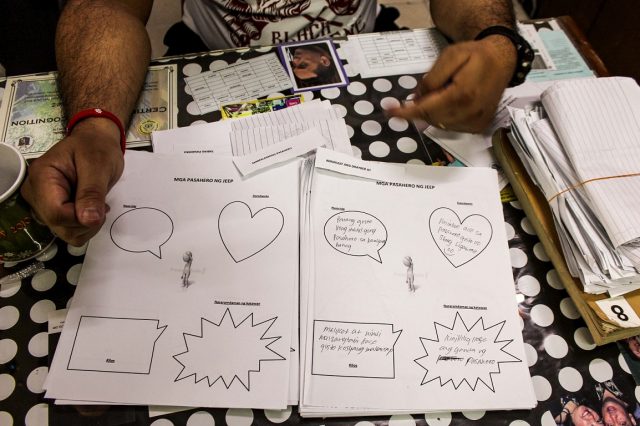
(Conclusion)
(This article is a modified version of the author’s undergraduate thesis, “Misguided Counseling?: An Investigative Study on the Hiring and Practice of Guidance Counselors in Public Secondary Schools in Quezon City,” done under the supervision of University of the Philippines journalism professor Yvonne T. Chua last year. VERA Files is published by veteran Filipino journalists taking a deeper look into current Philippine issues. Vera is Latin for “true.”)
When the proposed Guidance and Counseling Act was introduced in Congress, its authors believed the stiff requirements they were imposing on the professional registration of guidance counselors would contribute to the “development and enrichment of the Filipino family and society.”
Thirteen years after the passage of Republic Act 9258, however, the Professional Regulatory Board of Guidance and Counseling (PRBGC) thinks the law has done more harm than good.
“I always say, laws are enacted to solve and not to create problems. Eh ‘yung guidance and counseling law na (But the guidance and counseling law) RA 9258, it has created much problem,” PRBGC chairperson Luzviminda Guzman said.
“Maraming na-disenfranchise, naalis, nagkagulo-gulo (Many guidance counselors have been disenfranchised and removed from their jobs),” she added.
READ PART 1 HERE:
SPECIAL REPORT | Lack of registered guidance counselors forces schools to go around the law (Part 1)
In the government sector, Guzman said the Civil Service Commission (CSC) has removed from their posts guidance counselors who have worked for years, including in public schools, “because at this point in time, they are not yet licensed.”
“Naalis sila. Kawawa naman; nawalan sila ng trabaho (They were removed. I pity them; they lost their jobs),” she said. “Mabuti sana (It would have been better) if (after) they removed them, they should be given a position. Imagine, eight to 10 years, aalisin mga guidance counselors (guidance counselors would be sacked),” she said.
This is one reason the PRBGC is advocating the amendment of RA 9258 even as it stresses the importance of professionalizing the practice of guidance and counseling.
But the PRGBC’s accredited professional organization, the Philippine Guidance and Counseling Association (PGCA), strongly opposes any changes in the law.
“Hindi na dapat nila pwede i-downgrade ‘yun dahil ‘yun na nga ‘yung batas (They’re not supposed to downgrade it because that is the law), to professionalize (guidance and counseling). And the minimum requirement is (to have an) MA (degree). So they have to follow the law,” PGCA president Sheila Hocson said.
RA 9258 created the PRBGC, introduced a licensure examination for guidance counselors, and mandated a Code of Ethics and Code of Technical Standards on the practice of guidance counseling, among other breakthroughs.
Critics of the law, however, say it is unnecessary to require guidance counselors to be licensed in order to practice.
Arliana Arboleda, principal of Masambong High School in Quezon City, said: “Hindi kailangan na registered (It is not necessary that they are registered) because every teacher has the heart, a very big heart, to act as the parents of the students.”
But Guzman said she has witnessed how teachers untrained in guidance counseling have done it all wrong.
Having worked as a guidance counselor in a school before, she recalled how a teacher she knew gave irrational advice to students, going as far as bringing two students who were in a relationship to the municipal office to get married because the boy had gotten the girl pregnant.
“Probably, those who crafted the law, aware of situations like those, (thought that) guidance counselors should undergo training,” Guzman said.
But certain provisions make the law counterproductive because they are impossible to implement.
Article IV, Section 27 prohibits non-registered guidance counselors from practicing guidance and counseling. Article III Section 13C requires all applicants for registration to finish a master’s degree in guidance and counseling before taking the licensure examination.
According to a briefer presented by the PRBGC to the National Economic and Development Authority (NEDA) in late 2016, although there are 162 institutions nationwide that offer guidance and counseling courses, the Commission on Higher Education (CHED) has not issued policies, standards and guidelines (PSG) for the graduate program.
CHED said a technical committee consisting of academics, experts and practitioners is in the process of crafting the PSG for the guidance and counseling graduate program. It hopes to have the PSG out soon.
Guzman said few people take the licensure exam and few people pass it too, the consequence of having no common standards or curriculum.
Since 2008, when the first licensure exam for guidance counselors was administered, the passing rate has ranged from 55 to 65 percent. The highest was in 2009, at 72 percent, and the lowest, 2013’s 41 percent.
Of the 3,220 registered guidance counselors (RGCs) in the country as of July 2017, only 1,528 earned their licenses by passing the exam. The remaining 1,692 are those who qualified under the grandfather’s clause that was offered until March 2009.
The grandfather’s clause of RA 9258 allowed those who already have a master’s or doctoral degree in guidance and counseling and at least three years of experience doing guidance and counseling work to obtain their licenses without taking the exam.
Because of the shortage of RGCs, the PRBGC also admitted in its briefer that guidance counselors are having trouble implementing the K to 12 Law and the Anti-Bullying Law, both of which require services from registered guidance counselors, especially for career counseling and referral services.
In the past years, the PRBGC has tried to get Congress to amend the law. In 2012, it worked closely with Representatives Mariano Piamonte and Julieta Cortuna of A Teacher Party List who filed House Resolution No. 2057 in May 2015 seeking to inquire into the issues, concerns and controversies surrounding RA 9258.
The resolution listed some of the issues the PRBGC has been raising: the dearth of RGCs to meet the demand of basic and higher education institutions, the dilemma of many guidance and counseling practitioners who are discouraged from pursuing a master’s degree in order to take the licensure exam, and the predicament of tenured guidance counselors who face removal from their positions unless they acquire a guidance and counseling license.
The PRBGC has also raised its concern with the Department of Education. In one convention for guidance counselors organized by DepEd in May 2016, Guzman proposed lowering the qualifications for guidance counselors in response to the shortage of RGC.
To her disappointment, her proposal received unfavorable response. “Nag-react kaagad ‘yung mga… (The guidance counselors were quick to react).‘Oh no, we will not allow that because we worked hard for it’ That’s a sign of selfishness,” Guzman said.
The DepEd’s Quezon City Division Office raised the same concern to the DepEd Central Office.
According to Elena Santos of the Personnel Section of the division, Superintendent Elizabeth Quesada has discussed with Education Undersecretary for Planning and Field Operations Jesus Lorenzo Mateo the difficulty in hiring guidance counselors because of the license requirement.
PGCA’s Hocson, who sides with guidance counselors who oppose amending the law, said the organization believes what needs to be resolved are the salaries of guidance counselors and the creation of more guidance counselor items in DepEd and CHED.
“Dapat nga trabaho nila ‘yan eh, na pag-aralan (That should be their job, to study) how to improve the integrity and the life of counselors. Lalo na ngayon, ang dami-daming bullying, ang daming (drug) addiction (Especially now that bullying and drug addiction is rampant). So it’s also one major part of the work of counselors na hindi nila nakikita ‘yung significance (that they don’t see the significance of),” she said.
The PGCA presented its position paper to the House of Representatives, Senate and other government offices last May. The position paper was signed by the PRBGC.
Aside from the PGCA, the Guidance Counselors Association of the Philippines wrote a letter to Executive Secretary Salvador Medialdea in December 2016 seeking the reclassification and salary upgrading of guidance counselor positions in DepEd. The request was forwarded to the Department of Budget and Management (DBM) in January 2017 and to DepEd the following month.
Cleopatra Daisy Aguinaldo, a guidance counselor who has worked for 15 years at the Sergio Osmena Sr. High School in Quezon City, hopes DepEd would somehow look into the proposals. Aguinaldo obtained her license only in 2016 after returning to school to work for her master’s and taking the licensure exam.
Some university professors, however, say schools should rethink assigning teachers with no training to guidance and counseling work.
Lorelei Vinluan, a professor of Counselor Education at the University of the Philippines Diliman, said she and her colleagues have come across guidance counselors in public high schools who finished unrelated courses in college such as math, chemistry and physical education.
They are usually the ones who ask the most questions about the functions of guidance counselors in trainings she has conducted.
Vinluan said, “If it’s the blind leading the blind, saan pupunta ‘yung mga bata (where will they lead the children)?”









